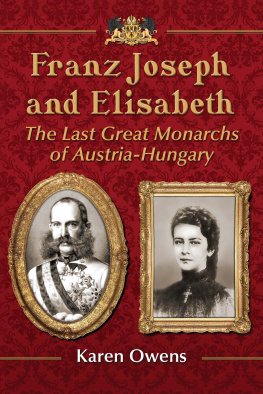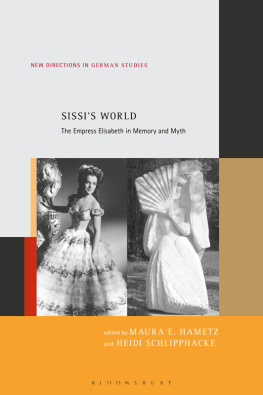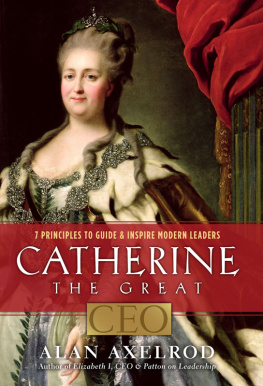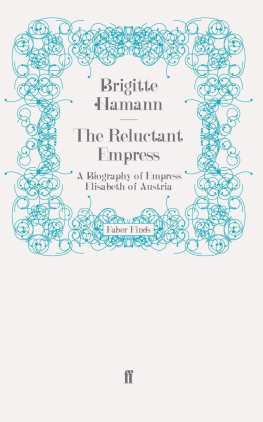This edition is published by BORODINO BOOKS www.pp-publishing.com
To join our mailing list for new titles or for issues with our books borodinobooks@gmail.com
Or on Facebook
Text originally published in 1930 under the same title.
Borodino Books 2017, all rights reserved. No part of this publication may be reproduced, stored in a retrieval system or transmitted by any means, electrical, mechanical or otherwise without the written permission of the copyright holder.
Publishers Note
Although in most cases we have retained the Authors original spelling and grammar to authentically reproduce the work of the Author and the original intent of such material, some additional notes and clarifications have been added for the modern readers benefit.
We have also made every effort to include all maps and illustrations of the original edition the limitations of formatting do not allow of including larger maps, we will upload as many of these maps as possible.
THE EMPRESS ELIZABETH OF AUSTRIA
by
KARL TSCHUPPIK
Translated by
ERIC SUTTON
He held sacred only his own will; he lived only his own dreams; and his grief was dearer to him than his very life.
ELIZABETH ON ACHILLES
ILLUSTRATIONS
EMPRESS ELIZABETH IN HUNGARIAN CORONATION COSTUME
DUKE MAX IN BAVARIA, ELIZABETHS FATHER
EMPRESS ELIZABETH IN THE 1860S
ARCH-DUCHESS SOPHIE, FRANZ JOSEPHS MOTHER
FRANZ JOSEPH I WITH THE CROWN PRINCE RUDOLF AND ARCH-DUCHESS GISELA, 1861
LUDWIG II WITH HIS BRIDE, DUCHESS SOPHIE
COUNT JULIUS ANDRSSY
DR. CONSTANTIN CHRISTOMANOS IN 1895
CROWN PRINCE RUDOLF IN 1877
KATHERINA SCHRATT IN THE EARLY 1880S
THE MURDERER, LUIGI LUCCHENI
THE FUNERAL PROCESSION IN GENEVA
One THE FAIRY PRINCESS
THE Duchess Ludovika of Bavaria was travelling with her two daughters, and with a very ambitious purpose in her head. The daughter of a princely house on her way to visit a prospective bridegroom is always on the very best of good behaviour. Princess Helene was sitting beside her sister in the carriage, like a patient on her way to the doctor. Her mother had taken Sisi with them to keep Helene cheerful, and to avoid being alone with Helene and her own ambitions all the long way from Munich to Ischl. Sisi, who was sixteen years old, did not know that it was a mothers right to play the part of Providence, and she could not tell what was the matter with her elder sister. She was as cheerful and unconstrained on the journey as she was when playing in the park at Possenhofen, or riding one of her fathers horses.
It was intended that Helene, the eldest of the five Princesses, should become the wife of the young Emperor of Austria. The plan had not been conceived in the Duchess Ludovikas family circle: conscious as she always was of being a Kings daughter, she never forgot that she, the youngest of the six daughters of Maximilian I of Bavaria, had married beneath her station. Karoline, her eldest sister, was an Empressthe wife of the Emperor Franz; Elizabeth, wife of Friedrich Wilhelm IV, sat on the throne of Prussia; Amalia, wife of King Johann, and Maria, Friedrich Augusts wife, were Queens of Saxony. The arch-Duchess Sophie, the most determined of the six Bavarian Princesses, had the reversion of the Imperial Crown of Austria; but she made a better choiceshe secured it for her eldest son, Franz Joseph. Only Ludovika, the youngest, had to resign herself to a humbler position. Her husband, Duke Maximilian, belonged to the younger branch of the Bavarian Royal House, and, by a ceremonial distinction, his title in the kingdom was not Duke of Bavaria, but Duke in Bavaria.
Ludovika found this very galling; and her main preoccupation was to increase her familys importance, and to secure a better establishment in life for her now marriageable eldest daughter than her own parents had thought it necessary to do for her. Still, it was only in her imagination that she had ventured to cast an envious glance at her Imperial nephew in Vienna. The young Emperor of Austria was Europes most eligible parti. Twenty-three years old; master of the now restored Habsburg power; in the eyes of the counter-revolutionary world the saviour and hero for whom they were waiting; a Prince Fortunatus, as charming as he was powerful and rich. Royal Princesses could find no better match. Franz Joseph would have been beyond the reach of the Ducal House of Possenhofen. The great scheme which was shortly to emerge from Ludovikas travelling carriage had been conceived by the Arch-Duchess Sophie, the young Emperors mother. This energetic and far-seeing woman wanted to complete her work. She had a right to regard herself as the saviour of Austria and the preserver of the Habsburg dynasty. Five years before, in 1848, in those days of perplexity, hesitation, weakness and surrender, among all the Arch-Dukes, Princes, Ministers, diplomats and Generals, there had been only one man at the Imperial Palace in Viennathe Arch-Duchess Sophie. Her determination extinguished the revolution in Central Europe. She overcame the scepticism and easy-going tolerance of the Court, put Freiherr von Kbecks famous system into practice, and placed the sabre of counter-revolution in the strong hands of Radetzky, Jellacic and Windischgratz. She gave an Emperor to Austriaher own son. And now she, the effective regent of the Empire, wished to choose a wife for the Emperor.
It was natural that her thoughts should turn to her own family. Reason and calculation are the best match-makers; and she was a faithful daughter of the Catholic Church. Arch-Duchess Sophie was a pious woman, enthusiastic in her faith. As she once had spent days and nights reflecting how to save the tottering throne for her son, so now she devoted all her care and thought to finding him a suitable wife. The peremptory precept of the Church narrowed the sphere of choice, and indeed it ultimately reduced itself to Munich. In this decision there were two advantages: she would do her duty by the Church in selecting a wife from a strict Catholic house, and she would also advance the fortunes of her family. The Arch-Duchess Sophie found no difficulty in opening her mind to her youngest sister Ludovika. It was marvellous glad tidings for Possenhofen. And the young Emperor? The young mans autocratic spirit, born of the battlefields of Hungary and the overthrow of rebellious Vienna, more uncompromising and indefeasible than the absolutism of prerevolutionary daysthis consciousness of power vanished outside his mothers door. The young Emperor was the most devoted son. His mother had re-established the throne once more; and the new sovereign became, in her presence, an obedient child. Whatever she did was wise and good. The philosopher of the new Absolutism, Staatsrat von Kbeck, had no need to appeal to God: To Franz Joseph, his mothers will was Divine Providence. And the mother had good reasons for wishing to see her son soon married.
Franz Josephs mother was one of those not uncommon Austrian women who are religious without being prudish. The most notable example of them was Maria Theresia. The affairs of sex were treated quite franklyan attitude, one feels instinctively, in harmony with the age-long aristocratic tradition of the Catholic Church. Just as Maria Theresia, in her capacity of an experienced mother, gives the most intimate advice in her letters to Marie Antoinette, so the Arch-Duchess Sophie was not in the least shy of her sons bedroom secrets. She thought it merely a matter of practical good sense to guide her sons first footsteps into that mysterious domain, a proceeding which had long been customary in the Imperial House. The phrase hygienic ladies was not invented at the Court, but by the cynical and occasionally witty aristocratic entourage; it was, however, a neat description of an institution regarded as necessary and reasonable. So long as the young Emperor took the arrangement for granted, without his emotions being seriously touched, his mother had time and leisure to consider the question of marriage. But in the last two years the Arch-Duchess Sophie had noticed with concern that her son was showing perilous signs of falling seriously in love with a lady who was, of course, quite an impossible match. It was time, then, to put an end to such a romance and look for a wife for Franz Joseph. After a period of anxious reflection, all details were agreed in an exchange of letters between the sisters, Sophie and Ludovika. Franz Joseph knew his cousin Helene, he had made her acquaintance in Munich and Ischl, and their relations seemed to indicate more than a little liking for each other. That was enough for the Emperors mother; but night and morning for weeks Ludovika had prayed that God would grant her child this great happiness.












